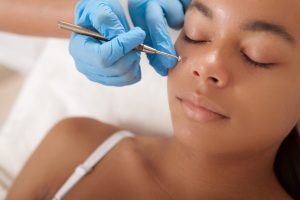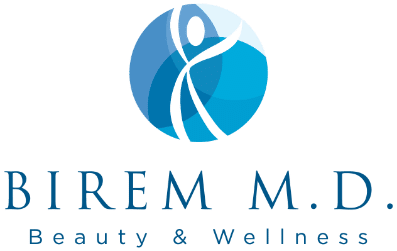
As acne becomes a widespread skin problem, it affects people of all ages, even adults, and causes emotional distress and physical disfigurement. With the help of acne therapy and lots of treatments, it can now bring the breakouts under control. More importantly, light therapy has become the go-to treatment that uses visible devices that kill bacteria on the skin and has been used by most dermatologists for the past 20 years.
What Is Acne?
Acne is a highly complex disease with elements of pathogenesis involving defects in epidermal keratinization, androgen secretion, sebaceous function, bacterial growth, inflammation, and immunity. The typical features of the acne condition include pimples, oily skin, blackheads or whiteheads, and possible scarring.
Moreover, it primarily affects skin with a relatively high number of oil glands, including the face, upper part of the chest, and back. Since acne is inevitable for most people, the perfect time to treat it is when the potential for scarring develops or when it becomes bothersome. When treated the wrong way, it might lead to a severe acne flare-up.
What Are The Factors That Causes Acne?
Here are some factors that cause acne in the face and around the body:
- Cosmetics: Some cosmetics and skincare products can clog pores (comedogenic). So it is crucial to read the list of ingredients and choose water-based or those that promote acne-free. Indeed, water-based products are usually best for those with acne conditions.
- Drugs: Some medications may cause or worsen acne, like those products that contain bromides, iodides, oral or injected steroids, and bodybuilders or athletes’ steroids. Anticonvulsant medications and lithium are also drugs that can cause or aggravate acne. These are not drug-related but mostly related to cases of acne conditions.
- Heredity: This plays a huge role since some people might inherit terrible acne due to heredity. If ancestors or one of the parents had severe acne, the acne would likely be more challenging to control.
- Pressure: In some patients, pressure from helmets, chin straps, collars, suspenders, and the like can aggravate acne.
- Occupations: Exposure to industrial products like cutting oils may produce acne in some jobs.
How To Treat Acne Conditions?
Acne scars don’t have a single treatment that is best for everyone. It is a combination of so many approaches that might improve the appearance of the skin, depending on the scar and skin type, and the severity of the scarring.
- Home skincare. While medicated creams, such as those containing azelaic acid or hydroxy acids, can help acne, the use of sunscreen can also limit the contrast between unscarred skin and a scar.
- Lifestyle. It is important to consider changing the lifestyle through moderation and regularity. However, it is given that not everyone can sleep eight hours a day, can eat healthy meals thrice a day, and can drink plenty of water a day. The most beneficial lifestyle change is never to pick or squeeze pimples even when it’s stubborn, as it would lead to acne scar.
- Soft tissue fillers. One thing that can plump the skin over indented scars is injecting collagen, fat, or other substances under the skin to make the scars less noticeable. Although the results are temporary, repeat treatments can retain their effect and has little risk of skin color changes.
- Steroid injection. As mentioned, some steroids are not recommended for acne, but consulting the right medical professional can help advise the right steroid that would work with acne conditions.
- Laser resurfacing. Most laser resurfacing procedures are popular and are often used on scars. However, this procedure may not be advisable for those with darker skin or a history of keloids since it can increase the risk of side effects.
- Energy-based procedures. One of the most popular treatments for acne today is pulsed light sources and radiofrequency devices that help make scars less noticeable without damaging the skin’s outer layer. Although results are subtle, patients are advised to repeat treatments to see optimum results.
- Dermabrasion. It’s another popular treatment that is used for severe acne scars. The doctor removes the top layer of skin with a rapidly rotating brush or other devices. Surface scars may be removed entirely, making deep acne less noticeable, but potential side effects that may be severe include scarring and skin color changes.
- Chemical peel. The application of a chemical solution to the scar tissue can remove the skin’s surface and minimize the deeper scars appearance. Repeating mild and medium peels to maintain results is usually advised, but patience can only have one deep peel. However, the potential side effects may include skin color changes with deep peels used on skin that are darker in color.
- Skin needling. A needle-studded device over the skin can stimulate collagen formation in the underlying tissue and help the acne condition. More importantly, this procedure is relatively simple, safe, and can be an approach to help acne scars with minimal risk of discoloring the skin. Again, results are subtle in this procedure, so repeat treatments are recommended.
- Surgery. Punch excision is a minimal procedure where doctors cut out individual acne scars and repair the wound with stitches or a skin graft. In the other method that’s called subcision, the doctor inserts needles under the skin to loosen fibers below a scar.
- OnabotulinumtoxinA (Botox). Injecting Botox relaxes the surrounding skin, improving acne scar appearance. This has the same temporary results, so repeat treatments are needed to retain the effect.
What Are The Best Skincare Routine for Acne Conditions?
There are so many essential skincare or regimens that can help combat acne conditions:
- It is a must to gently cleanse the face and body twice daily, especially the areas that are prone to acne.
- Applying a gel or cream is a must and must contain 5% benzoyl peroxide; an alternative is a sulfur or resorcinol. Also, using a pad containing 2% salicylic acid every morning will help exfoliate.
- Applying a spot cream at night that contains sulfur to the affected areas is suggested.
- The use of a light skin moisturizer and water-based makeup is recommended.
The Bottom Line
As acne becomes a prominent facial concern today, it is triggered by hormonal or environmental factors, including pregnancy, menstruation, high humidity, using oily cosmetics, or taking certain medications. A severe case of acne can cause scarring, which can be emotionally damaging. At Bireme MD, Beauty & Wellness, your acne therapy begins with a personalized session with Dr. Birem, who will customize your acne treatment plan.
Bireme MD, Beauty & Wellness uses Venus VersaTM IPL with SmartPulseTM to treat acne’s underlying cause and symptoms. Blue and red lights are delivered simultaneously to achieve this effect. By destroying acne-causing bacteria with blue light and decreasing inflammation with red light, faster healing can be achieved. The treatment is safe, efficient, and quick. Thanks to a real-time cooling system, the treatment is virtually pain-free. After the acne treatment, you should resume your regular daily routine.

